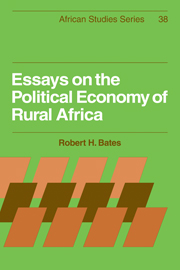5 - The nature and origins of agricultural policies in Africa
Published online by Cambridge University Press: 26 January 2010
Summary
In this last essay I examine the location of rural dwellers in the political economies of the post-independence states of Africa. I do so by exploring the agricultural policies of these states and the position to which they assign the economic interests of farmers.
Agricultural policy is made up of those decisions by governments which alter the prices farmers confront in the markets which determine their incomes. To explain agricultural policy – and thus the assignment of farmers to official positions in the political economies of the African states – one must explain patterns of market intervention engaged in by governments. It requires as well an explanation for the biases which governments introduce in the performance of these markets and hence in the allocation of economic resources.
As will be seen, the post-independence states of Africa – like their counterparts elsewhere in the third world – adopt agricultural policies which possess certain distinctive features. They both tax the output of farmers and subsidize agricultural inputs. The policies are project-based rather than price-based. They seek to promote increased agricultural production without strengthening economic incentives by offering higher farm prices. They introduce economic inefficiencies in the form of price distortions, non-competitive rents, and poorly designed development projects. And, above all, they violate the economic interests of most farmers.
To explain the content of agricultural policies and the patterns of bias which they engender, I explore several basic models of policy formation. Each makes certain assumptions concerning the state. Each accounts for some features of agricultural policy. Each also exhibits major shortcomings.
- Type
- Chapter
- Information
- Essays on the Political Economy of Rural Africa , pp. 107 - 133Publisher: Cambridge University PressPrint publication year: 1983
- 3
- Cited by



